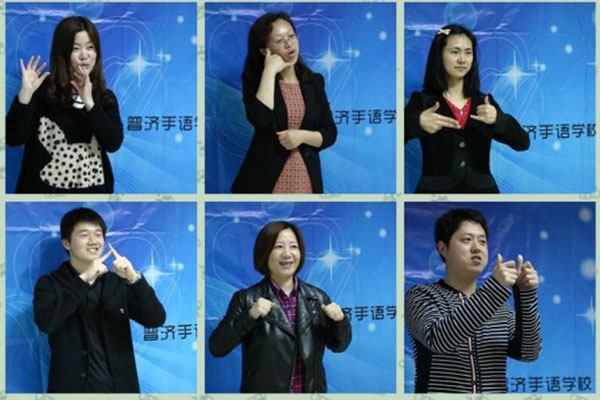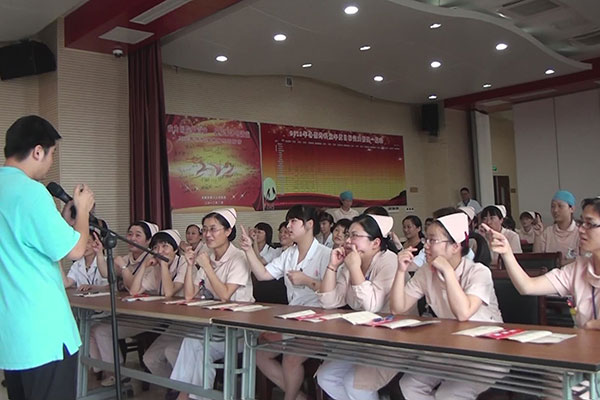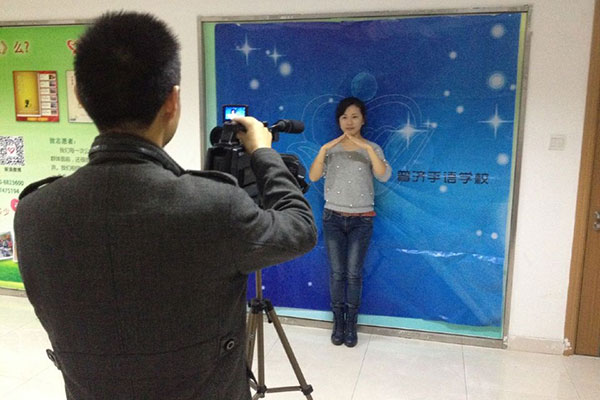
Volunteers participate in a program to make the video dictionary of Chinese sign language.[Photo/China Daily]
A charity in Wuxi, Jiangsu province, recently made national headlines with its video dictionary of Chinese sign language, which is reported to be the first of its kind.
“We didn’t expect such extensive media reports on the video sign-language dictionary and are surprised to receive lots of interview requests nowadays, both from local media and those from other provinces,” says Hong Jian, director of Puji Charity, which helps local people with hearing and speaking disabilities.
“When we started the program, we just wanted to encourage the public to learn sign language to communicate with those who cannot hear or speak.”
There are lots of sign-language dictionaries and videos teaching students in special education schools how to “speak” sign language. But it is the first time in China that videos teaching Chinese sign language are arranged in alphabetical order, and it is searchable, Hong says.
The charity was officially registered with local civil-affairs authorities in 2012. It was created to help the physically challenged, elderly people living alone and families in financial crisis because of severely ill members. But people with impaired hearing are the primary beneficiaries for whom the facility provides help.

An employee from Puji Charity teaches sign language to the medical staff at a hospital in Wuxi, Jiangsu province.[Photo/China Daily]
According to government statistics, China has more than 20 million people with severe hearing loss. In Wuxi, the population is about 8,000.
Thanks to modern technology, with help of special training and hearing aids, many children born with hearing loss are able to hear and to learn how to speak like their peers.
However, those who missed that chance when young cannot speak or hear properly and have to rely on sign language to communicate.
“Deaf people live not only in silence but also in loneliness and misunderstanding. Many are shy and have low self-esteem,” Hong says.
“It is important for them to be able to communicate with people around them. Since they cannot speak as we do, we should learn their language and reach out to them.”
The charity has initiated various events and programs to help people know more about deaf people’s world and living experience, such as showing people how to communicate with others without speaking, teaching them sign language and filming the daily lives of people with severe hearing problems, Hong says.
They have also cooperated with driving schools to help people with hearing problems get easy access to driving lessons.
Two years ago, the facility started a long-term program to provide free sign-language learning sessions to people from all walks of life, such as primary and middle school students, civil servants, and white-collar workers.
“We discovered that a lot of people are interested in learning sign language, as long as they are given the opportunity,” says Zhang Yanbin, an employee with the charity.

A volunteer is recorded for the video sign language dictionary.[Photo/China Daily]
The Sign Language School program also has online sessions, for the convenience of people who want to learn on their own in their spare time.
At first, the program used words and pictures to illustrate how to sign. But the organization later decided to make a video dictionary to present sign-language more clearly, Zhang adds.
Many people, including professional sign-language teachers, sign-language TV presenters, people with hearing or speaking problems and their families, volunteered to pose for the videos.
Despite lacking professional cameramen and editors, the charity earlier this year managed to upload the first group of videos, which allowed learners to look up a word by searching and retreiving.
Words selected for the video dictionary are those commonly used in daily life, especially those related to medical treatment, because safety is the most important need for people who are physically challenged, Hong says.
There are now more than 1,000 words in the video dictionary, but not one is related to wars, Hong notes.
As of now, more than 40 people are involved in making the dictionary; half of them are people with hearing or speaking impediments and their families.
Hong is excited that so many Chinese citizens are learning about the video dictionary from media reports.
“It is a good thing that more and more people try to understand the world of people with hearing or speaking problems. That is our ultimate aim.”
